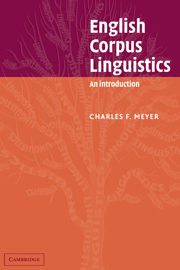Book contents
1 - Corpus analysis and linguistic theory
Published online by Cambridge University Press: 03 December 2009
Summary
When the first computer corpus, the Brown Corpus, was being created in the early 1960s, generative grammar dominated linguistics, and there was little tolerance for approaches to linguistic study that did not adhere to what generative grammarians deemed acceptable linguistic practice. As a consequence, even though the creators of the Brown Corpus, W. Nelson Francis and Henry Kučera, are now regarded as pioneers and visionaries in the corpus linguistics community, in the 1960s their efforts to create a machine-readable corpus of English were not warmly accepted by many members of the linguistic community. W. Nelson Francis (1992: 28) tells the story of a leading generative grammarian of the time characterizing the creation of the Brown Corpus as “a useless and foolhardy enterprise” because “the only legitimate source of grammatical knowledge” about a language was the intuitions of the native speaker, which could not be obtained from a corpus. Although some linguists still hold to this belief, linguists of all persuasions are now far more open to the idea of using linguistic corpora for both descriptive and theoretical studies of language. Moreover, the division and divisiveness that has characterized the relationship between the corpus linguist and the generative grammarian rests on a false assumption: that all corpus linguists are descriptivists, interested only in counting and categorizing constructions occurring in a corpus, and that all generative grammarians are theoreticians unconcerned with the data on which their theories are based.
- Type
- Chapter
- Information
- English Corpus LinguisticsAn Introduction, pp. 1 - 29Publisher: Cambridge University PressPrint publication year: 2002
- 1
- Cited by



